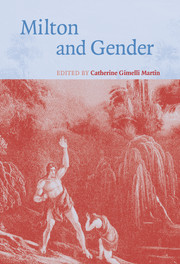Book contents
- Frontmatter
- Contents
- List of illustrations
- Notes on contributors
- Acknowledgments
- Abbreviations
- Introduction: Milton's gendered subjects
- PART I MASCULINITY, DIVORCE, AND MISOGYNY IN MILTON'S PROSE
- 1 The gender of civic virtue
- 2 The aesthetics of divorce: “masculinism,” idolatry, and poetic authority in Tetrachordon and Paradise Lost
- 3 Dalila, misogyny, and Milton's Christian liberty of divorce
- PART II THE GENDERED SUBJECTS OF MILTON'S MAJOR POEMS
- PART III GENDERED SUBJECTIVITY IN MILTON'S LITERARY HISTORY
- Index
1 - The gender of civic virtue
Published online by Cambridge University Press: 22 September 2009
- Frontmatter
- Contents
- List of illustrations
- Notes on contributors
- Acknowledgments
- Abbreviations
- Introduction: Milton's gendered subjects
- PART I MASCULINITY, DIVORCE, AND MISOGYNY IN MILTON'S PROSE
- 1 The gender of civic virtue
- 2 The aesthetics of divorce: “masculinism,” idolatry, and poetic authority in Tetrachordon and Paradise Lost
- 3 Dalila, misogyny, and Milton's Christian liberty of divorce
- PART II THE GENDERED SUBJECTS OF MILTON'S MAJOR POEMS
- PART III GENDERED SUBJECTIVITY IN MILTON'S LITERARY HISTORY
- Index
Summary
Throughout the political and ecclesiastical turmoil of the 1640s Milton observes and laments encroachments on liberty in church government, the family, and monarchy; again and again he deplores the loss of manhood which accompanies and characterizes acquiescence to these institutions. The ideal citizen of Milton's political prose is inevitably not just male but masculine in ways that are less about the performance of power over others than about individual choices between authority and submission. Such is the stuff of daily life in the free yet always hierarchical society which Milton envisions throughout the prose and poetry. The divorce tracts cast in domestic form the reconciliation of the theory of equal native liberty with the theory of naturally unequal capacities. In doing so, they anticipate the logical underpinnings of Milton's political vision in The Tenure of Kings and Magistrates and Eikonoklastes and, especially, the republicanism of The Readie and Easie Way to Establish a Free Commonwealth: in writing about both marriage and monarchy, Milton argues that consent alone legitimates binding human relationships. The implicit hero of these arguments is a figure near despair at his society's embrace of the tyranny of custom but adamant in his pursuit of a social organization founded on reason and liberty. This explicitly masculine heroism is, in Milton's terms, about courageous self-management and articulation, about the mind, and very specifically not about the body.
- Type
- Chapter
- Information
- Milton and Gender , pp. 19 - 33Publisher: Cambridge University PressPrint publication year: 2005
- 1
- Cited by

